
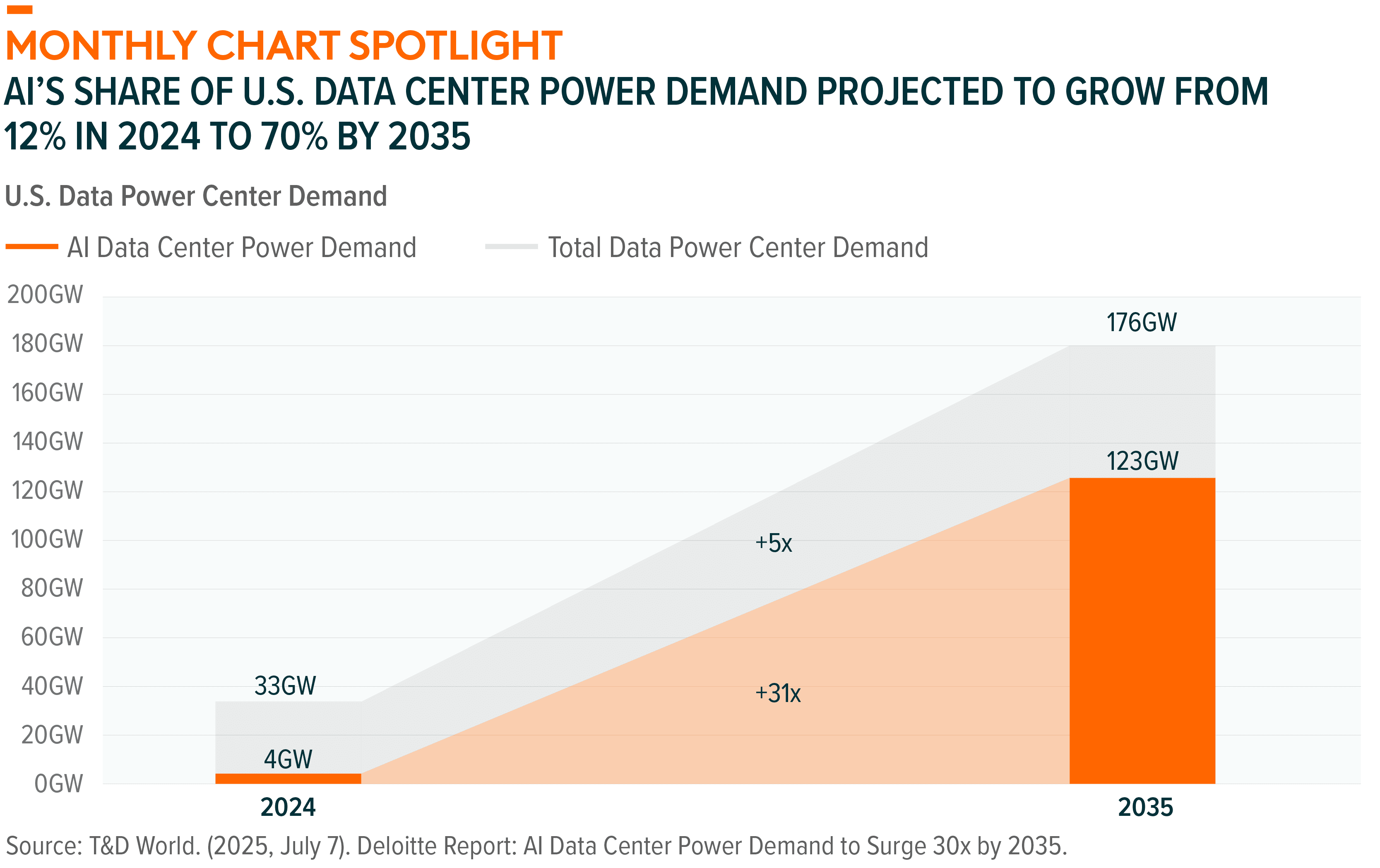
U.S. Electrification
AI Surge and Nuclear Revival Accelerate the Push Toward Grid-Scale Electrification
U.S. AI data center power demand is projected to grow more than thirtyfold by 2035, rising from 4 gigawatts (GW) in 2024 to 123 GW. AI is expected to account for 70% of total data center electricity use by then, up from just 12% today.1 This type of growth signals a structural shift where AI becomes the predominant driver of grid load growth, placing unprecedented pressure on utilities, power production, grid planning, and the construction sector. Constellation Energy announced that it would invest billions of dollars to expand nuclear power capacity, including an investment to restart the Crane Clean Energy Center. Expected to come online in 2027 with 835 megawatts (MW) of power, the plant is projected to create 3,400 jobs and generate $3.6 billion in tax revenue and $16 billion in economic value.2 As AI-driven data center demand surges, these investments mark a major step toward scaling clean energy infrastructure and strengthening grid resilience to support U.S. electrification.

Defense Tech
U.S. Army Advances AI-Driven Modernization with Enterprise Software Deal
Palantir Technologies signed a landmark agreement with the U.S. Army to consolidate 75 existing software and data analytics contracts into a single, streamlined enterprise contract worth up to $10 billion over 10 years. The deal, a significant evolution in the Army’s digital modernization strategy, aims to accelerate the integration of advanced decision-making tools, battlefield intelligence systems, and predictive maintenance software. Palantir platforms, including Gotham and the Maven Smart System, are already embedded across Army operations.3 The deal reflects a broader shift toward modular, enterprise-wide procurement of commercial AI software, allowing the military to standardize data across domains, enhance interoperability, and deploy AI capabilities more efficiently. It also underscores the Pentagon’s ongoing shift toward AI-driven warfare and highlights how commercial defense tech firms are now critical to U.S. national security infrastructure.

Artificial Intelligence
Agentic AI Momentum Intensifies as the Industry Moves Toward Autonomous Task Execution
OpenAI launched ChatGPT Agent, a major evolution of its AI-assisted task automation initiatives. The agent combines web interaction, deep research synthesis, and conversational intelligence into a single workflow. The unified tool operates on a specially trained model using reinforcement learning, which enables it to complete complex, multi-step tasks such as calendar planning, restaurant reservations, research reports, slide decks, and online shopping.4 Amazon Web Services (AWS) launched an AI agent marketplace, aiming to simplify access to autonomous AI agents. Anthropic, a key launch partner, offers its Claude-based agents and tools through the platform. Businesses and developers can use it to monetize their agents via subscriptions or usage-based pricing, with AWS taking a modest cut.5 In our view, these launches along with others like Salesforce’s Agentforce 3, set the tone for the next era of AI innovation, where task-completing agents scale the capabilities of large language models beyond today’s chat-based interfaces.

U.S. Infrastructure
Historic Rail Merger to Forge the Country’s First Transcontinental Freight Network
Union Pacific agreed to acquire Norfolk Southern in an $85 billion cash-and-stock deal, the largest railroad merger in U.S. history. The combined company would create the country’s first coast-to-coast freight rail network, spanning over 50,000 miles and connecting 43 states, 100 ports, and 10 international gateways. The companies project up to $2.75 billion in annual cost synergies by 2029, driven by better asset utilization, reduced switching, and improved train speeds. With single-line service, cross-country transit may be reduced by 1–2 days. The merger is expected to strengthen U.S. supply chain resilience, accelerate the revitalization of domestic manufacturing, and help the rail sector recapture freight volumes that have moved to trucking. A formal regulatory filing will be submitted to the Surface Transportation Board by January 2026, with the deal expected to close in early 2027.6

Robotics & Artificial Intelligence
Amazon Hits 1 Million Robots and Unveils an AI Model That Orchestrates Its Fleet
Amazon recently deployed its one‑millionth robot to a fulfillment center in Japan, joining a global fleet operating across more than 300 facilities. Amazon also unveiled DeepFleet, a generative AI foundation model created by using Amazon’s cloud-based machine learning service SageMaker and internal logistics data. Acting as an intelligent traffic‑management system, DeepFleet reduces robotic congestion and improves travel efficiency by approximately 10%, which accelerates order fulfillment, lowers costs, and cuts energy usage. Meanwhile, Amazon has invested heavily in retraining, upskilling over 700,000 employees to fulfill roles such as robotics technicians and flow-control specialists.7 DeepFleet extends generative AI beyond language into operational robotics, transforming static automation into real‑time predictive logistics. The resulting gains, including leaner operations and smarter warehouse layouts, demonstrate how AI foundation models are reshaping manufacturing and fulfillment infrastructures.

FinTech
GENIUS Act Reshapes Fintech Innovation and Confidence in Stablecoins
The passage of the GENIUS Act (the Act) establishes the first comprehensive U.S. regulatory framework for payment stablecoins—digital tokens pegged to fiat currencies like the U.S. dollar. The Act mandates that only permitted payment stablecoin issuers—federally or state‑approved entities—can issue stablecoins in the United States. Also, stablecoins must be backed by high‑quality liquid assets such as cash or short‑term Treasuries. Issuers must perform regular audits, release monthly reserve disclosures, and operate under bank-grade oversight according to the Bank Secrecy Act. The regulatory clarity that the Act provides is expected to foster institutional confidence in using stablecoins for payments, remittances, and tokenization.8 By treating stablecoin issuers like financial institutions, the Act encourages broader FinTech adoption. For example, Fiserv recently debuted a bank-friendly stablecoin called FIUSD that integrates directly into its existing infrastructure, allowing financial institutions to adopt stablecoin payments without overhauling systems.9

THE NUMBERS
The following charts examine returns and sales growth expectations by theme, based on their corresponding ETFs or indices.
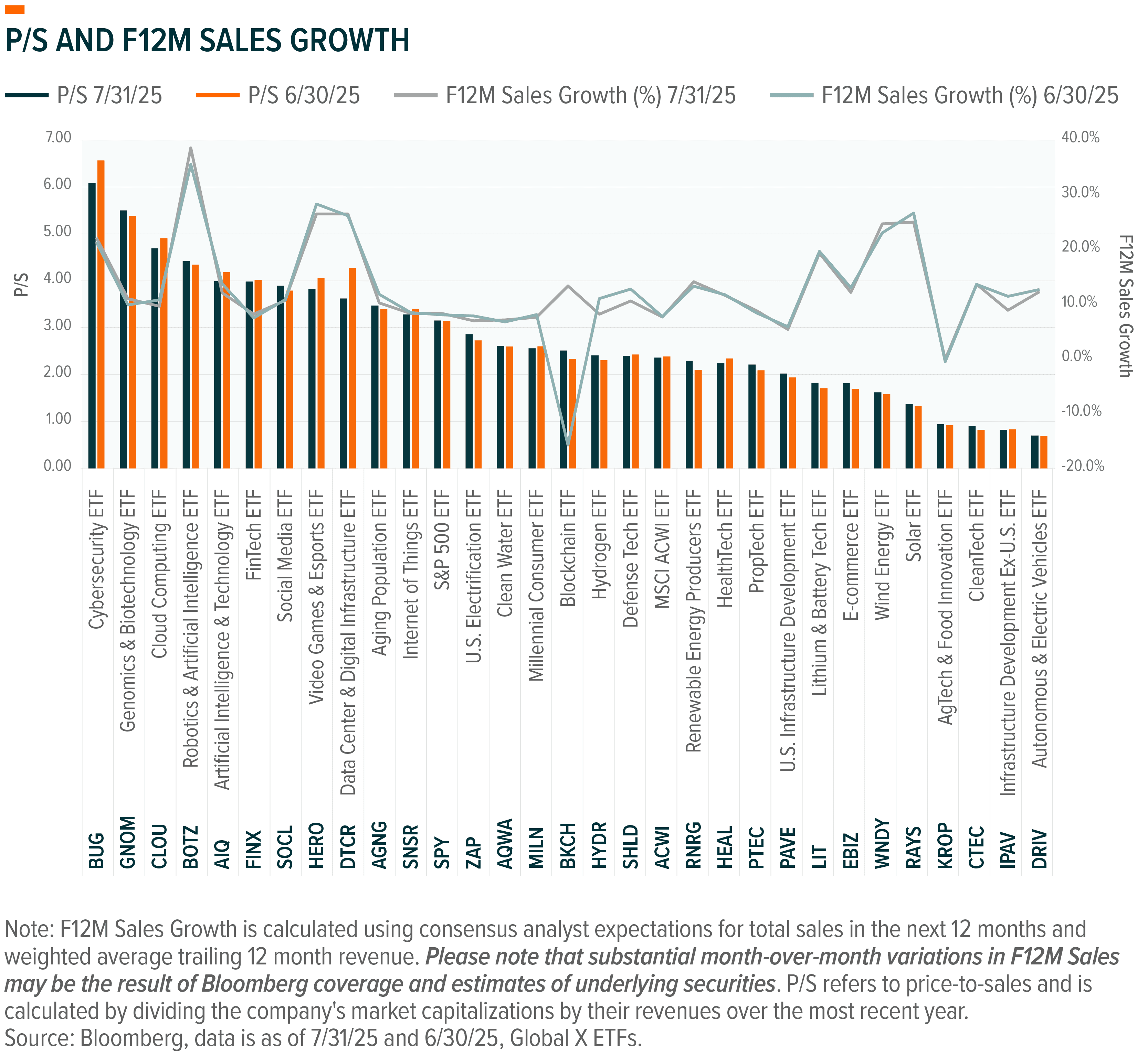
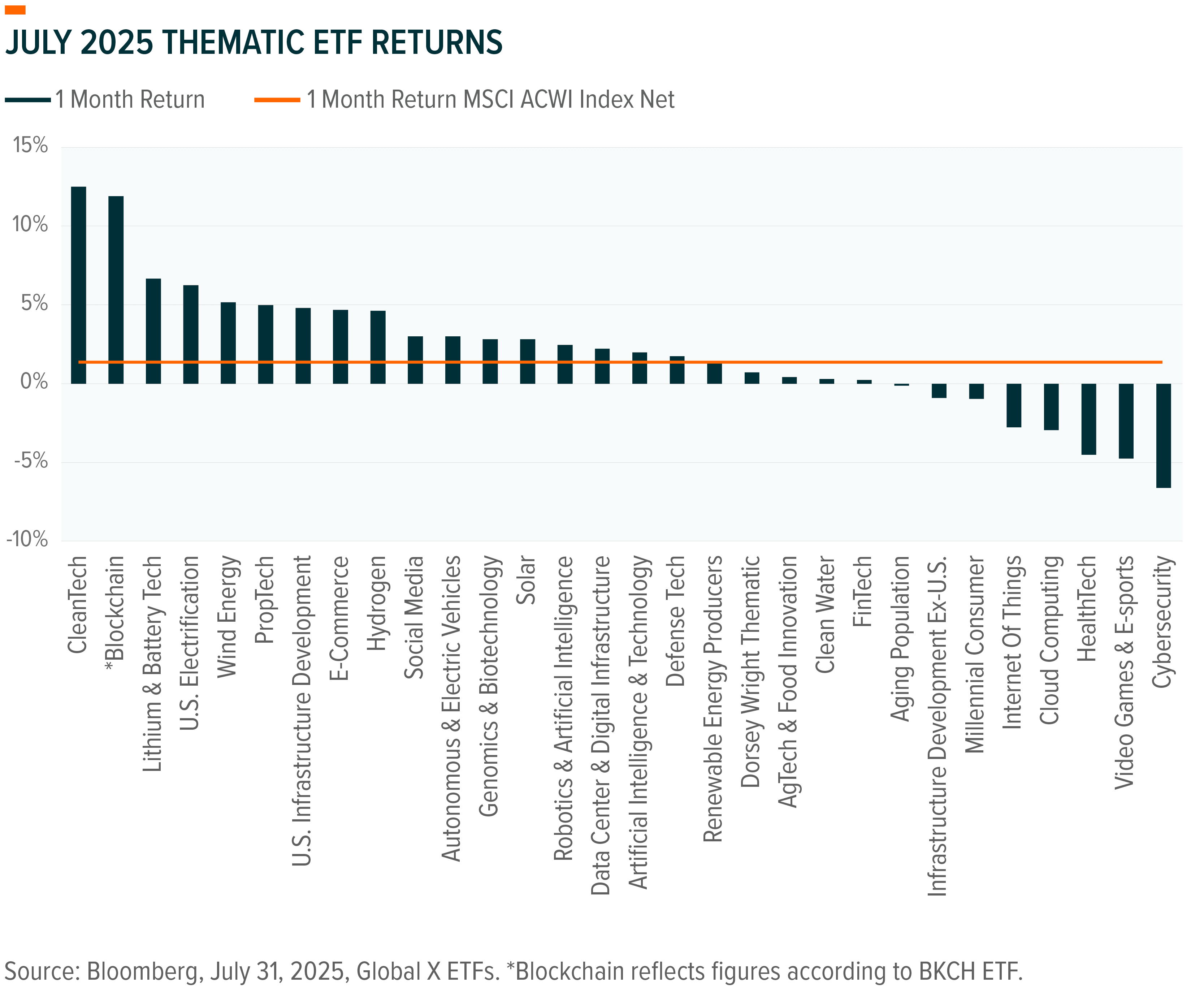

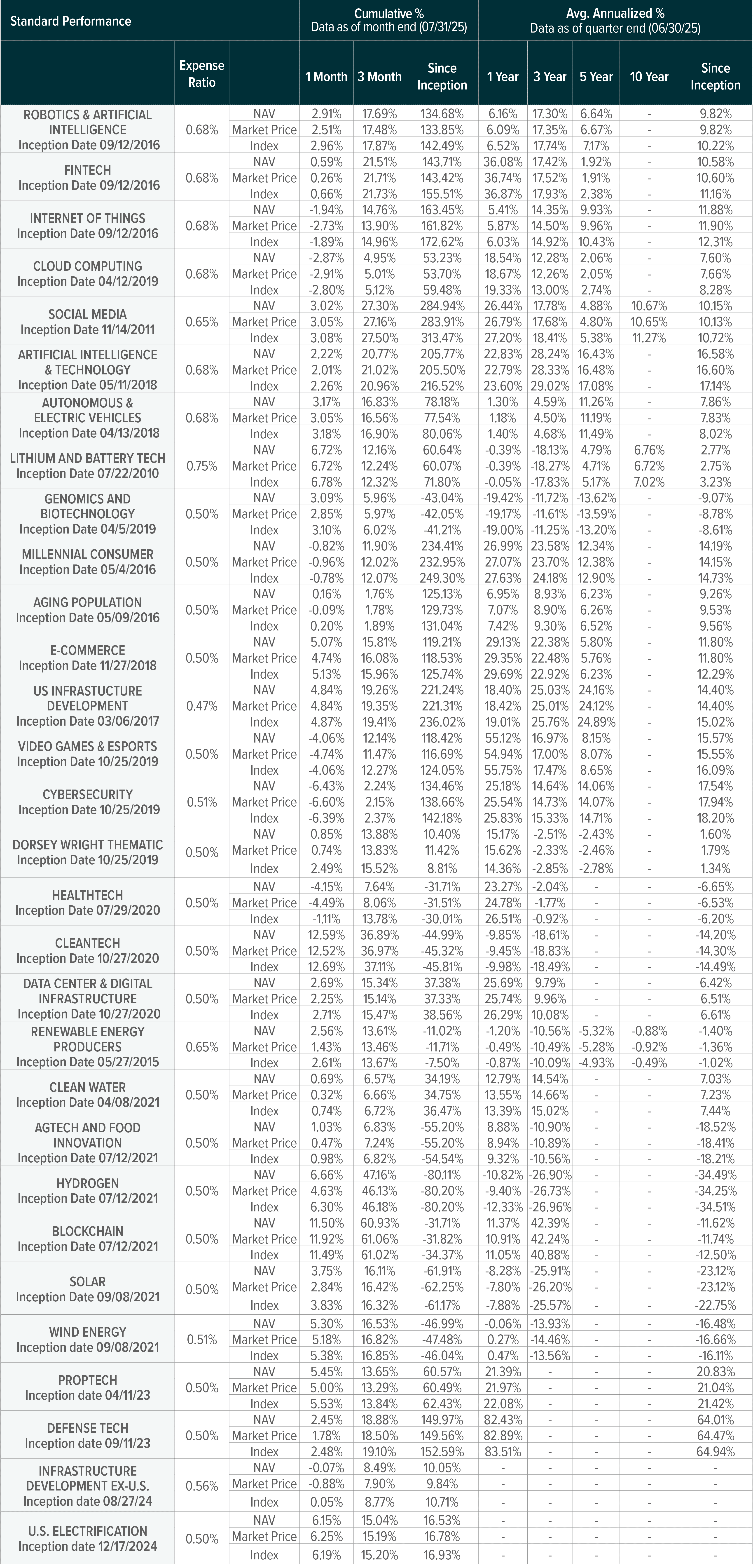
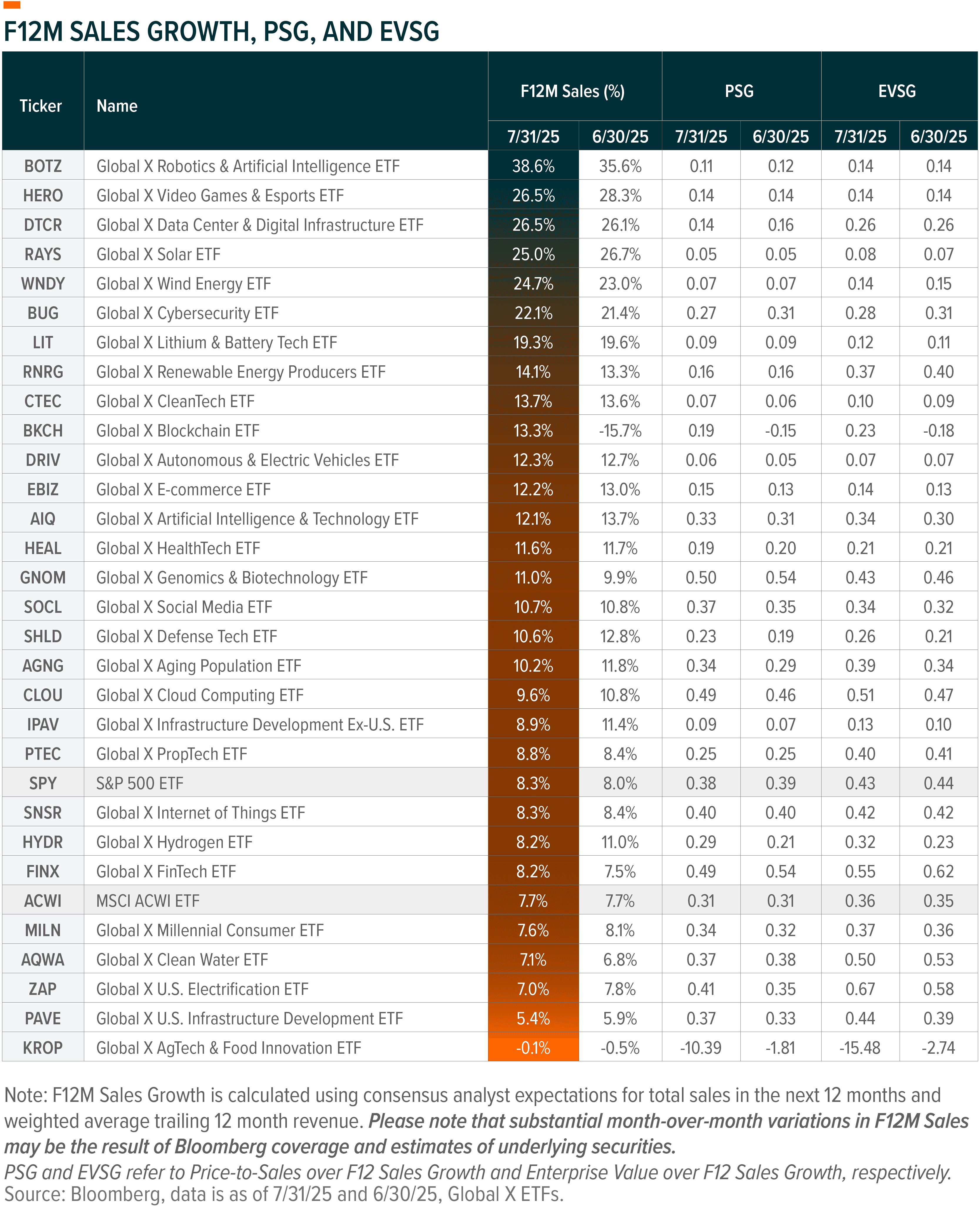
KEEP UP WITH THE LATEST RESEARCH FROM GLOBAL X
To learn more about the disruptive themes changing our world, read the latest research from Global X, including:
- The Next Big Theme: July 2025
- Beyond Baby Boomers: Global X ETFs Survey
- Why Global Infrastructure? Why IPAV?
- A Decade of Change: How Tech Evolved in the Last Five Years and Bold Bets for the Next Five
- 2025 Midyear Outlook
ETF HOLDINGS AND PERFORMANCE
To see individual ETF holdings and current performance across the Global X Thematic Suite, including information on the indexes shown, click these links:
- Disruptive Technology: Artificial Intelligence & Technology ETF (AIQ), Blockchain ETF (BKCH), Robotics & Artificial Intelligence ETF (BOTZ), Cybersecurity ETF (BUG), Cloud Computing ETF (CLOU), Autonomous & Electric Vehicles ETF (DRIV), Data Center & Digital Infrastructure ETF (DTCR), FinTech ETF (FINX), Video Games & Esports ETF (HERO), Lithium and Battery Tech ETF (LIT), PropTech ETF (PTEC), Defense Tech ETF (SHLD), Internet of Things ETF (SNSR), Social Media ETF (SOCL), U.S. Electrification ETF (ZAP)
- Consumer Economy: Millennial Consumer ETF (MILN), E-Commerce ETF (EBIZ), Genomics & Biotechnology ETF (GNOM), Aging Population ETF (AGNG), HealthTech ETF (HEAL)
- Infrastructure & Environment: U.S. Infrastructure Development ETF (PAVE), CleanTech ETF (CTEC), Renewable Energy Producers (RNRG), Clean Water ETF (AQWA), Hydrogen ETF (HYDR), Solar ETF (RAYS), Wind Energy ETF (WNDY), AgTech & Food Innovation ETF (KROP), Infrastructure Development ex-U.S. ETF (IPAV)
- Digital Assets: Blockchain & Bitcoin Strategy ETF (BITS), Bitcoin Trend Strategy ETF (BTRN)
- Multi-Theme: Dorsey Wright Thematic ETF (GXDW)
Appendix: Thematic Expected Sales Growth Graph Indices
AgTech & Food Innovation: Solactive AgTech & Food Innovation Index
Aging Population: Indxx Aging Population Thematic Index
Artificial Intelligence & Technology: Indxx Artificial Intelligence & Big Data Index
Autonomous & Electric Vehicles: Solactive Autonomous & Electric Vehicles Index
Blockchain: Solactive Blockchain Index
Clean Water: Solactive Global Clean Water Industry Index
CleanTech: Indxx Global CleanTech Index
Cloud Computing: Indxx Global Cloud Computing Index
Cybersecurity: Indxx Cybersecurity Index
Data Center & Digital Infrastructure: Solactive Data Center REITs & Digital Infrastructure Index
Defense Tech: Global X Defense Tech Index
E-Commerce: Solactive E-commerce Index
FinTech: Indxx Global FinTech Thematic Index
Genomics: Solactive Genomics Index
HealthTech: Global X HealthTech Index
Hydrogen: Solactive Global Hydrogen Index
Infrastructure Development ex-U.S.: Global X Infrastructure Development Ex-U.S. Index
Internet Of Things: Indxx Global Internet of Things Thematic Index
Lithium & Battery Technology: Solactive Global Lithium Index
Millennial Consumer: Indxx Millennials Thematic Index
PropTech: Global X PropTech Index
Renewable Energy Producers: Indxx Renewable Energy Producers Index
Robotics & Artificial Intelligence: Indxx Global Robotics & Artificial Intelligence Thematic Index
Social Media: Solactive Social Media Total Return Index
Solar: Solactive Solar Index
U.S. Electrification: Global X U.S. Electrification Index
U.S. Infrastructure: Indxx U.S. Infrastructure Development Index
Video Games & Esports: Solactive Video Games & Esports Index
Wind Energy: Solactive Wind Energy Index